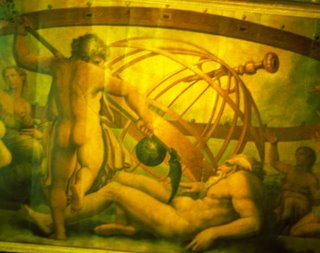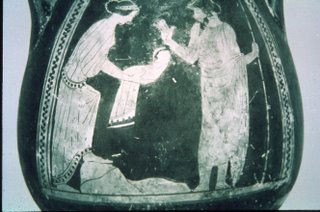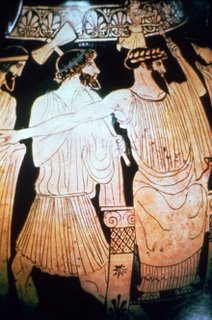Remember the name John
Yoo. One day he'll be known as the primary theorist of "Bushism." Not that Bush has closely read and applied Yoo's academic writings or depended heavily upon his policy papers. Didn't need to. FDR didn't really model his economic policies after J. M. Keynes, and Teddy Roosevelt's progressivism didn't really
follow Herb Croly. In each case, a writer came along
in medias res who so embodied the presidential zeitgeist that he came to seem as if he had designed it. Although Yoo played an active role in forging Bush's defense of a "unitary executive" who exercises unlimited powers in time of war--even to the point of
lawlessness and torture--Bush would have developed those policies with or without his young academic bootlick.
Yoo, however, has given voice to a movement at the highest levels of power, and, most importantly, he has sought to reconcile Bush's power grabs with an "originalist" theory of the Constitution. A daunting intellectual feat, as I've argued
before. Alexander Hamilton certainly had a robust vision of presidential power, but his views were so extreme and unpopular that he was unable to voice them in public venues. This is a problem for any "originalist" argument, however, since originalists typically argue that since law is a
public act, the private intentions of influential founders matter less than common understandings. This helps conservatives on issues like federalism and religion, where the public of 1787 was somewhat less nationalistic and "liberal" than were their leaders.
But executive power is an altogether different kettle of fish. Here, Jefferson and Madison represented the mainstream position, which was deep suspicion of executive power. Madison's alliance with Hamilton in writing the
Federalist Papers lasted only until ratification, after which they became implacable opponents, convinced as Madison was that Hamilton's party was conspiring against the people's liberties. Intimidating the press, carrying out a bellicose and secretive foreign policy. You know the drill. To get around this problem, Yoo tries to argue that, all appearances to the contrary, the Constitution silently incorporated British common law conceptions of executive power, ignoring the fact that delegates to the Convention, even defenders of a strong executive, repeatedly say that they are NOT creating a Brit monarchy.
Then there's John Adams, the "conservative" president against whom Jefferson and Madison rebelled in the realigning Revolution of 1800. Although he wasn't at the Convention, Adams had sent copies of his
A Defense of the Constitutions of the United States of America to delegates in an effort to influence their decisions.
In the
Defense, Adams develops an idiosyncratic theory of executive power. Starting from a critique of Machiavelli, for whom he expresses admiration, Adams claims that the Florentine had neglected the role that an executive could play as a "check" within a "mixed government." Adams asserts, as he often will later in letters to Jefferson, that the primary concern of government is to find ways of limiting
aristocratic power. Positioning himself as a defender of "
the middling people, who it must be confessed, have been in all ages and countries. . . the most virtuous part of the community," Adams contends that the nobles and commons must be divided within the government to keep their interests distinct and visible, thus mandating a bicameral Senate and House. If elites are ghetoized in the Senate, they will have less power, especially those "certain families [that] will spring up. . . in every injudicious mixture of aristocracy and democracy, to be the pest and ruin of them." Nice irony there. Not that Adams trusts the masses, but his explanation of their threat is more complex than we might suppose from his reputation: "all history and experience shows, that mobs are more easily excited by courtiers and princes, than by more virtuous men, and more honest friends of liberty." Adams concludes that both nobles and commons will be prone to oppress, led astray by wealthy demagogues. The answer? "The great desideratum in a government is a distinct executive power, of sufficient strength and weight to compel both these parties, in turn, to submit to the laws."
Adams was disappointed by the Constitution, however, especially once he became Vice President. In a series of 1789 letters to Roger Sherman, a convention delegate whose influence rivalled Madison's, Adams complains that the executive powers granted by the Constitution are
overly weak. Why? The delegates were obsessed with preventing the U.S. from being a "monarchical republic" like the Brits. In particular, Adams complains that the executive was deprived of legislative power (since his veto can be overriden), and he forecasts that legislative power will grow so overwhelming that the executive will no longer be capable of balancing the factional strife between Houses.
The next year, in his
Discourses on Davila (1790), Adams jumped the shark. Repelled by the democratic passions of the French Revolution, Adams began to openly celebrate aristocracy and a monarchical executive to which all citizens could "look up. . . like the rays of a circle from all parts of the circumference, meeting and uniting in the centre," so as to provide "uniformity, consistency, and subordination." Adams now attacks Machiavelli as overly populist and goes on to defend elite inequalities: "It becomes the more indispensable that every man should know his place, and be made to keep it. Bad men increase in knowledge as fast as good men; and science, arts, taste, sense, and letters, are employed for the purposes of injustice and tyranny." Stop the people, before they can
learn!Adams later expressed shock when Jefferson accused him of being a scheming monarchist and his ally, John Taylor, dubbed Adams an American "Filmer," after England's great apologist of royal absolutism. In responding to his critics, Adams consistently claims that he intends a strong executive to be a bullwark against the true evil: aristocracy and its inevitable defenders in the Senate. But this self-defense is hard to reconcile with Adams's unabashed attack on democracy in
Davila. Years later, Adams would explain the true source of this dispute in a June 30, 1813, letter to Jefferson. Jefferson was soft of "terrorism." No shit. His word. He uses it a dozen times in a nine paragraph letter. "What think you of Terrorism, Mr. Jefferson?," Adams asks in the accusative.
History records that Adams lost this debate.
Davila was widely ridiculed. Jefferson and Madison created an electoral realignment in 1800 that dominated American politics for the first half of the 19th century. As Adams later concedes in a letter to Jefferson, "In Truth my 'defense of the Constitutions' and 'Discourses on Davila,' laid the foundation of that immense Unpopularity, which fell like the Tower of Siloam upon me. Your steady defense of democratical Principles, and your invariable favourable Opinion of the french Revolution laid the foundation of your Unbounded Popularity." As Machiavelli and Jefferson understood, but Adams did not, the democratic people will usually get it right in the long run.
So much for Yoo's "originalism."









